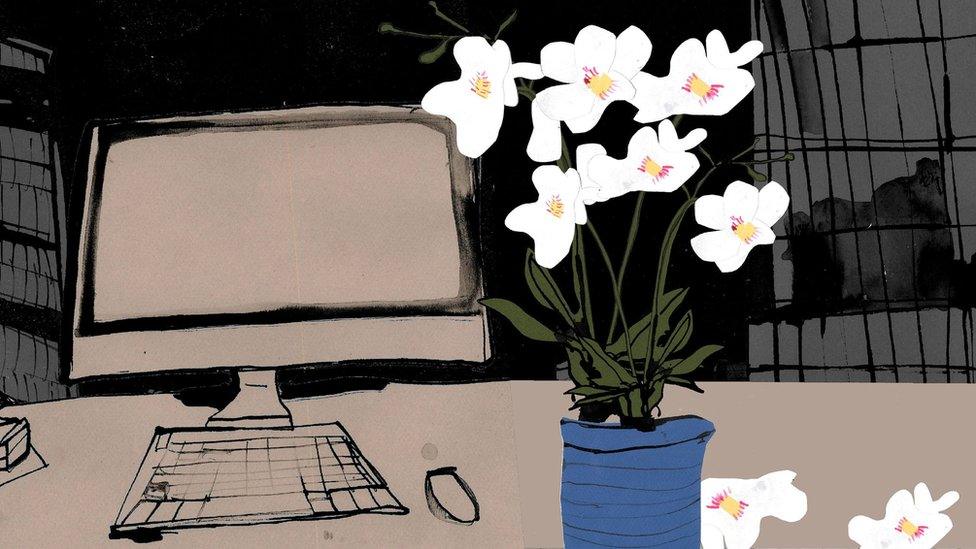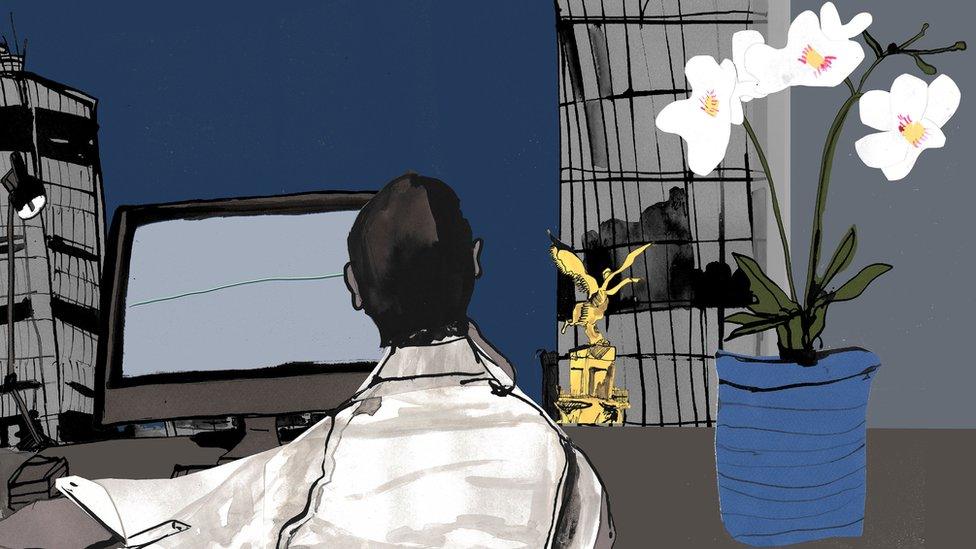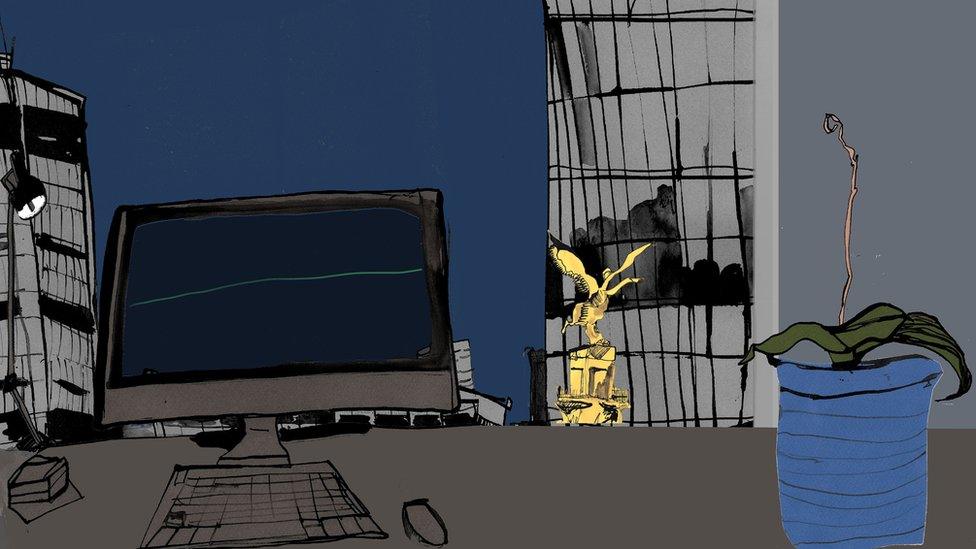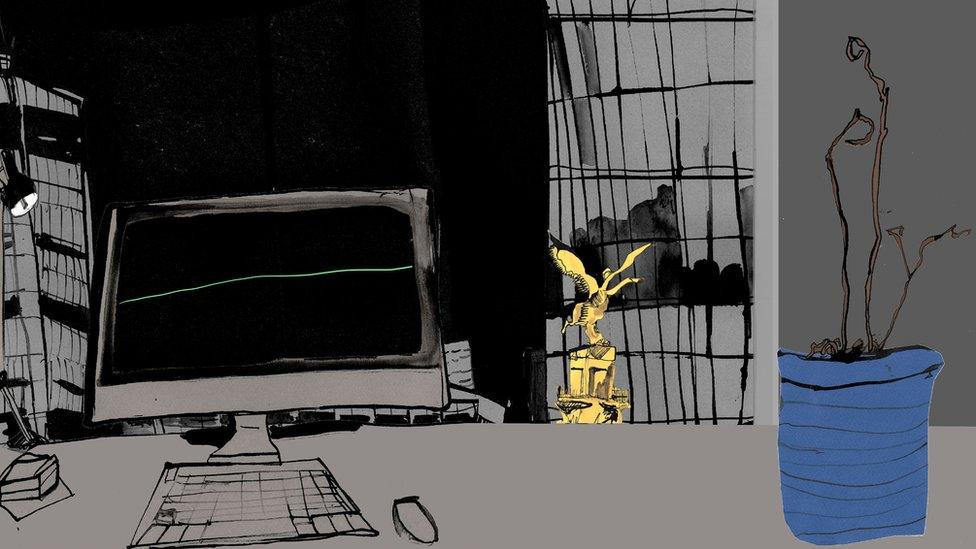What do you do when a colleague dies?
- Published

How should firms and managers plan for the death of a co-worker or colleague, when the topic of death is often taboo in many cultures and where workplace relationships are often viewed as secondary to the ones we form outside?
The day Miguel went into hospital, Carina had come looking for him with a question.
"They said 'Oh, he's not feeling well. But everything is going to be OK'."
Carina and Miguel worked together at the Mexican branch of a global marketing company. Miguel was a brand manager and Carina an assistant.
Though it was a large firm, their team felt small and everyone got along. "We used to go out sometimes. We went to bars after work almost every Friday."
Miguel was 35 and a bit of a workaholic. Carina says his work ethic was incredible but sometimes she was concerned to see him skipping lunch so often, or just snacking the whole day at his desk.
At the same time she says Miguel always had time for his colleagues: "He was an amazing person."

"Especially in big companies it feels at the end like we are disposable," says Carina
True to form, Miguel kept working while he was in hospital. Company managers said it was nothing serious and as he continued to answer emails, his colleagues believed it.
But weeks went by and Miguel did not reappear. One day he stopped replying to emails.
"It was a Friday and we received an email out of nowhere saying HR wanted to meet with the whole company."
The staff had an idea what this meeting was for. Carina couldn't quite believe she was about to hear the 35-year-old colleague she'd seen just weeks ago had died.
She says one of the worst things that day was the way the HR representative spoke about Miguel. This person wasn't close to him, and Carina felt as though they were describing an asset the company had lost. "Like if the office was on fire and we lost some computers. It felt impersonal, just too cold.
"Especially in big companies, it feels at the end like we are disposable."
In much of the world death is a taboo subject, and in the office this taboo is often far stronger. A received idea of professionalism makes people think they cannot express their emotions when someone dies.

When someone dies there are business concerns as well as personal ones
Carina's story is a familiar one to Madelaine Swift. She is a senior protection advisor at Focus Oxford Risk Management, which provides insurance and consulting to companies when an employee dies. Her job is to make sure firms don't suffer critical failures in their business with the loss of an employee, especially a key employee.
This is the awkward side of the issue. Nobody wants to talk about it but when someone dies there are business concerns as well as personal ones.
After Miguel died, Carina says his desk stayed untouched for a long time. Even when his replacement came, some of his things were still on the desk. Obviously none of his friends wanted to be the one to clear them away, but for management not to do something about it was another failing.
"They could at least have cleaned his space. It was weird."
Ms Swift says while we tend to think of those people we have loved as "irreplaceable", very often in the workplace a colleague will indeed need to be replaced.
"You have to be sensitive because it is not just about business. It could be your best friend, your line manager - someone you have a really close relationship with."
She says it is down to a firm's managers to think through the difficult decisions they may have to make - and to have plans in place.
But at the same time, a company needs to think about how staff are coping.
"There is no right or wrong answer. You almost have to just go with the flow. You have to have a plan but you have to make sure you can evolve."
Kirsty Minford, a psychotherapist who works with organisations at times of change or loss, says many firms' first impulse is to say little when a colleague dies, for fear of doing or saying the wrong thing, or divulging something the family might not want known.
But this can be hard on the staff. "When you talk to the employees or people it has impacted, they tend to yearn for more communication and more information," she says.
Yet work relationships are often perceived as being secondary to those outside of the office and a colleague can be "just someone you work with".

Bereavement can lead to people quitting their jobs if they feel pressured to return to normal too quickly
Kirsty says she understands why, given this perception and a general reluctance to discuss death, firms often botch the handling of it. She says companies need to understand work relationships are real and have an effect on their employees.
"Many of us spend an enormous amount of our waking time with work colleagues, sometimes more than we spend with our families."
She says one thing managers can do is consult with their team on how best to honour a person's memory, be it an award in their name, a tree planted or a plaque.
And when it does come time to replace somebody who has died, there are ways to do it sensitively. She suggests slightly changing the person's title or the desk arrangement so it doesn't feel so much like a replacement.
"(An) organization I worked with brought a temporary worker in two days after. The work needed doing, absolutely. But to sit them at the desk of the person who had died, and not communicate either to the temp or to the team why they were there and what had happened before, it just really missed some key human aspects of grief."
She says this isn't just about compassion. Bereavement can lead to people not lasting in their jobs if they feel pressured to return to normal too quickly, or feel they can't justify their grief over someone who wasn't a direct family member or lifelong friend.
Carina left her firm several weeks after Miguel's death was announced. She was already planning to leave but says she was happy to go after the way it was handled.
"When I think about the reaction I feel anger. But when I think about (Miguel) I remember small situations, where he could have given me the answer in two seconds but he was like 'OK, let me explain everything to you'. Even though he had ten thousand things to do.
"He was an incredible person, so I remember him with a lot of respect."
Illustrations by Katie Horwich

For more on this, you can listen to BBC World Service's Business Daily programme on how companies and staff deal with death at work.